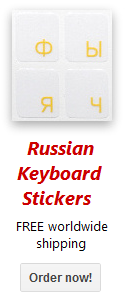 FR FR |
About us | Home | User agreement | Link to us |
The Determinative Pronouns
The words сам (oneself), весь (all), всякий (every), каждый (each/every), иной (other), другой (another), любой (any) are Russian determinative pronouns. They refer to definite but not specific actions and features of objects. Compare the following phrases to get the idea.
хороший ученик
(a good student)vs.
каждый ученик
(every student)другой ученик
(another student)
Changes by cases, gender, and number
In the Russian language, the determinative pronouns change by gender, number and cases.
Change of сам (oneself) by gender and number
| Singular masculine | Singular neuter | Singular feminine | Plural (any gender) |
| сам | само | сама | сами |
| весь | всё | вся | все |
| всякий | всякое | всякая | всякие |
| каждый | каждое | каждая | каждые |
| иной | иное | иная | иные |
| любой | любое | любая | любые |
| другой | другое | другая | другие |
Change of сам (oneself) by cases*
| Case | сам |
| Nominative | сам |
| Genitive | самого́ |
| Dative | самому́ |
| Accusative | самого́ (animated) сам (inanimate) |
| Instrumental | сами́м |
| Prepositional | (о) само́м |
*Note, that the singular neuter, singular femine, and plural forms also change by cases in Russian.
The determinative pronouns ка́ждый (each), любо́й (any), вся́кий (every) are used to single an object (person or thing) out of a number of similar ones. For example:
- Она экономит каждую копейку.
- (She saves every kopeck.)
- Мы в любом случае поговорим с ним.
- (We'll talk to him in any case.)
The pronouns весь, вся, всё, все are used not only with nouns (весь день) but also without them. They should be either neuter or plural when used separetely. For instance:
- Всё прошло очень быстро.
- (Everything happened very quickly.)
- Все спешат домой.
- (Everybody is hurrying up home.)
Related Lessons
Got questions?
Ask them in the Russian Questions and Answers — a place for students, teachers and native Russian speakers to discuss Russian grammar, vocabulary, pronunciation, and other aspects of the Russian language.
Copyright 2001-2026 MasterRussian.com | Privacy Policy | Contact Us
 Russian Lessons
Russian Lessons
- Russian alphabet
- Names of letters
- Russian Q&A new
- Pronunciation: Cons.
- Pronunciation: Vowels
- Noun Gender/Number
- Cases of Nouns
- Russian Greetings
- Personal Pronouns
- Learning Russian
- 1000 Common Words
- 500 Russian Verbs
- Top Russian Nouns
- » All lessons
- » Guest lessons
 Browse Topics
Browse Topics
- Start learning Russian
- Forum
- Bookstore
- Dictionaries
- Russian - basic
- Russian - adv
- Pronunciation
- Russian Blog new
- Reading
- Test & quizzes
- Translation
- Verbs
- Verb Conjugations
- Russian numbers
- Russian Tests new
- Vocabulary
- Writing
- Folk music
- Fun stuff
- Leo Tolstoy
- Learner's lore
- Literature
- Personal blogs
- Picture Dictionary new
- Proverbs
- Publications
- Radio & TV
- Russian culture
- Schools in Russia
- Russian Words
- Russian names
- Software
- Russian Words iPhone
Clicks the "Like" button below to get daily updates on Facebook!
Click "Add to circles" to learn Russian on Google+

Search MasterRussian

English » Russian dictionary

WORD OF THE DAY
![]() RSS
|
iGoogle
|
My Yahoo!
RSS
|
iGoogle
|
My Yahoo!
Meaning: to give, to let, to allow
Pronunciation: [daht']
Learn Russian words! »
TODAY'S STREET SIGN

Russian: Вход со двора
English: Entrance from the backyard
FOLLOW US ON TWITTER

MasterRussian on Twitter


